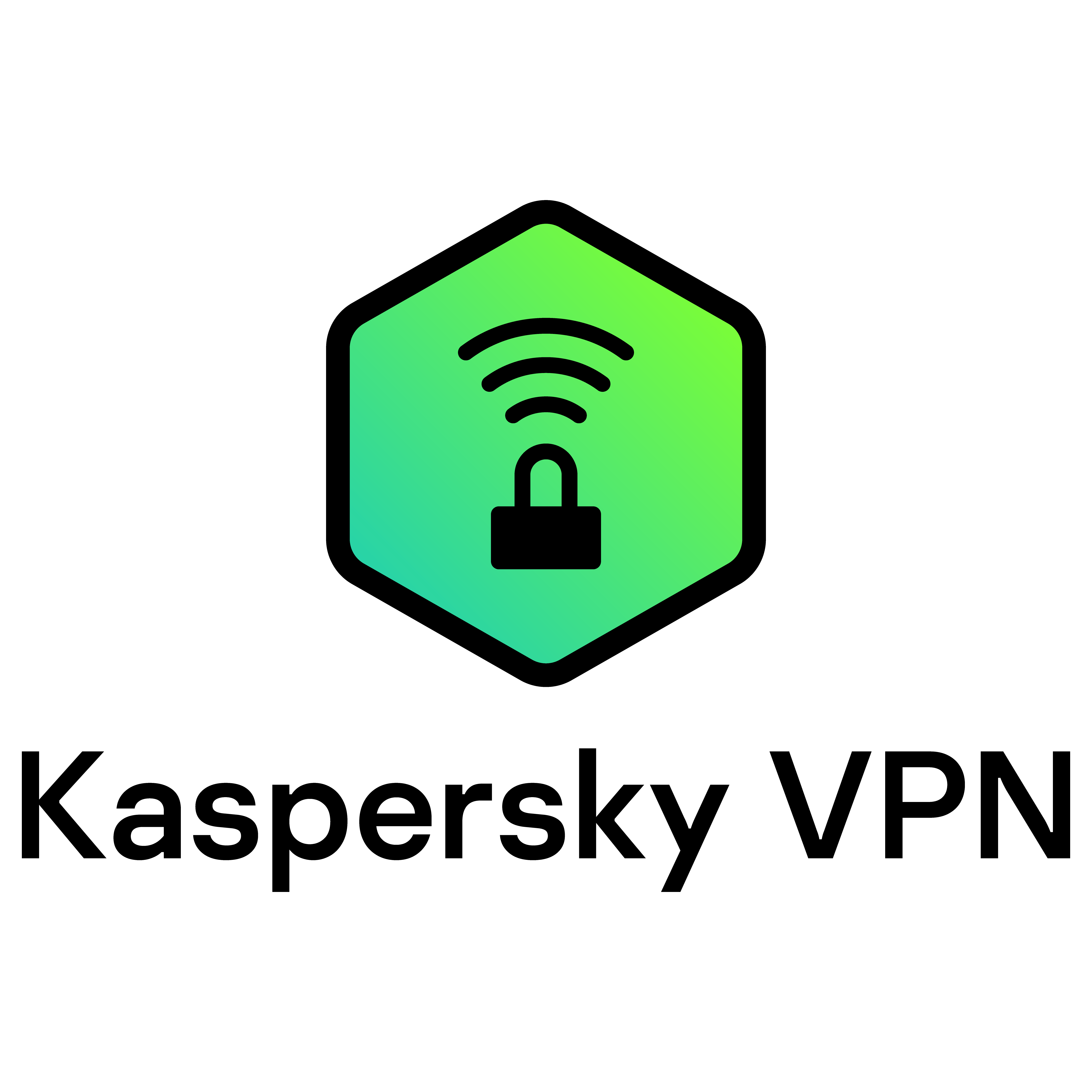Kaspersky VPN Secure Connection Review (2024): Fast VPN, Questionable Privacy
The Kaspersky VPN Secure Connection is the company’s VPN offering. Kaspersky is already known for having one of the best antivirus programs around, but this is designed to offer browsing security.
Kaspersky VPN Secure Connection isn’t the first choice for most people. But we wanted to see what it’s all about and to give you an unbiased opinion about it.
The company’s connection to Russia has failed to endear it to many people. However, in 2022, Kaspersky announced that it was shutting down its operations in Russia after the country invaded Ukraine.
We tested the Kaspersky VPN Secure Connection thoroughly, and here’s our full review, including performance speeds, security, and other features. Let’s get started!
Kaspersky VPN Secure Connection: A Short Review
| Pros | Cons |
|---|---|
| Fast speeds | Questionable privacy policy |
| Excellent streaming ability | Limited protocols |
| Budget-friendly, although prices change based on location | Limited payment options |
| No split tunneling | |
| Flagged by the US government |
The Kaspersky VPN Secure Connection has fast VPN servers, matching the speeds of some of the fastest VPNs on the market. Despite its performance, Kaspersky VPN’s safety leaves much to be desired.
Although it uses 256-bit encryption, its privacy policy shows that it’s willing to share user information with third parties. Furthermore, the company’s ties to Russia has given it a bad reputation both in the USA and Europe.
That said, the VPN service is easy to install and use. Its user interface is simple and clean, and you should have no difficulty finding your way around its client.
If you’re looking for a VPN for streaming, the Kaspersky VPN Secure Connection is a handy choice because it unblocks the most popular streaming sites, including Netflix and Hulu. It’s also great for torrenting.
Kaspersky VPN Secure Connection VPN has servers in over 30 countries, which is respectable. However, it’s nowhere near the big players, like NordVPN, which has servers in 59+ countries.
Kaspersky VPN Secure Connection charges a discounted $15 for an annual subscription, which is their introductory pricing (U.S. and Canada). It renews for $38.99 from the next year onwards. However, pricing changes depending on location, so it might not be the same for you.
However, its prices are cheaper than many premium VPNs. There’s also a free version, so it might be a good choice for a short browsing session.
| 💵 Price |
From $2.50 per month |
| 📱 Operating systems | Android, iOS, Mac, Windows |
| 💻 Connections | 5 |
| 💳 Payment methods | Credit card, PayPal |
| 🔒 Protocols | OpenVPN |
| 📥 Torrent options | Torrenting allowed |
| 📅 Money-back guarantee | 30 Days, Money-back guarantee |
| 📋 Logs | Connection Logs |
| 🎬 Works with |
|
Speed – How Fast is Kaspersky VPN?

All VPNs will reduce your speeds to an extent. However, the best ones have a marginal impact, enabling you to browse, stream videos and download torrents without hassle.
In our testing, we were impressed with Kaspersky VPN’s download and upload speeds across the board, earning it a 8/10 rating in our books. Here’s a summary of our findings:
- Kaspersky VPN has barely any impact on download and upload speeds.
- There were no speed fluctuations during daily use, even while gaming and torrenting.
Speed test results for Kaspersky VPN
We started off our Kaspersky VPN Secure Connection speed tests by measuring our speeds without a VPN. Those values served as our benchmark, helping us gauge speed drop-offs.
Next, we connected to servers across several continents to get an idea of how the VPN performs both locally and in far-flung locations. We’ve summarized our findings in the table below.
Note that your actual speeds may differ from the values in the table, based on your internet speed and location. We ran our tests from the Netherlands with a high-speed internet connection.
| Server | Download (Mbps) | Upload (Mbps) | Ping (MS) |
|---|---|---|---|
| No VPN | 94.71 | 94.73 | 3 |
| Fastest server (Amsterdam) | 94.02 | 94.35 | 7 |
| Netherlands (Amsterdam) | 93.53 | 94.47 | 6 |
| United Kingdom (London) | 92.64 | 97.16 | 34 |
| United States East (New York) | 90.65 | 92.69 | 92 |
| United States West (Los Angeles) | 66.05 | 88.06 | 144 |
| Germany (Frankfurt am Main) | 89.82 | 93.77 | 10 |
| Japan (Tokyo) | 51.31 | 18.38 | 225 |
| Australia | 30.04 | 9.52 | 302 |
| Brazil (Sao Paolo) | 56.86 | 60.3 | 219 |
| Canada (Montreal) | 83.03 | 95.65 | 106 |
| South Africa | 21.18 | 78.41 | 174 |
As you can see from the table, Kaspersky VPN is remarkably fast and can rub shoulders with some of the fastest VPNs out there.
There were no significant download and upload speed drop-offs when we connected to servers in the Netherlands, eastern U.S, Canada and the UK.
However, our download speed in the western United States took a big hit. That’s not surprising because of the increase in ping or distance from our testing location.
In a similar fashion, we noticed considerable speed drop-offs when we connected to servers in faraway countries from our testing location, including Japan, Australia, South Africa and Brazil. Such changes are normal, as you can see in the speed test results of our ExpressVPN review.
Speed during daily use
We browsed the internet while connected to Kaspersky VPN and did not experience any lags or hitches. Everything from emailing, downloading attachments, and surfing social media went smoothly. Downloading torrents was a breeze as well. We were able to download large files without difficulty.
We were able to watch a handful of YouTube videos and stream Netflix without any buffering or delays. To put the VPN through its paces, we played League of Legends and Grand Theft Auto V Online — two resource-intensive games. Fortunately, we didn’t notice any lag while playing, and the gameplay was smooth.
Safety – How Secure is Kaspersky VPN?

One of a VPN’s main tasks is to keep you safe while using the internet. Kaspersky’s VPN lacks some safety features, and the privacy policy is confusing. That’s why we gave the VPN a 6/10. Here’s a summary of our conclusions:
- Kaspersky uses AES 256-bit encryption.
- It only uses the OpenVPN protocol.
- It has been flagged in the US and Europe because of its alleged ties to the Russian government.
- You can use the kill switch to ensure there are no leaks.
- The VPN requires personal information, including your name, email and residential address.
Protocols
Kaspersky VPN offers AES 256-bit encryption, which is practically uncrackable. This encryption is paired with the OpenVPN protocol, which offers a fine mix of speed and security and is great for using a VPN on multiple devices. Unfortunately, that’s the only protocol Kaspersky offers.
The slower, but more reliable, TCP, is missing. There’s no support for the newer and much faster WireGuard either. There are various other VPN protocols, but Kaspersky opts to stick with one.
For instance, IKEv2 is best for mobile devices, while WireGuard’s ultra-fast speeds make it perfect for data-intensive activities like streaming and gaming. If you want a secure VPN with a suite of protocol options, go with NordVPN.
Logging and privacy
Kaspersky VPN claims on its website that it’s a zero-logs VPN, but you have to take that with a pinch of salt. Granted, most VPNs collect some logs to be able to provide their services; however, Kaspersky seems to collect more than necessary, including:
- Email address
- License number
- Information about your computer, such as the model, make, type of processor, version of the operating system installed, and geographic location
- Information about nearby WiFi networks is collected, including SSID, encryption, timestamps of connection and disconnection
- Anonymized SHA256 hash of your local IP address
It’s concerning that Kaspersky makes the following statements in its privacy policy:
“We also may share your information with vendors that provide services to us, including companies that provide web analytics, data processing, advertising, e-mail distribution, payment processing, order fulfilment, and other services.”
The company is willing to share data with law enforcement “to investigate, prevent, or take action regarding potential or suspected illegal activities, fraud, threats to the personal safety of any person, or violations of the Services Terms and Conditions, to comply with applicable law or respond to valid legal processes, including from law enforcement.”
The above statements are concerning because Kaspersky is rumored to be linked with the Russian government. In fact, in 2017, the American government banned its agencies from using Kaspersky software, citing concerns with the company’s Russian connection.
The year after, the European Parliament passed a resolution, classifying Kaspersky’s software as dangerous.
Although Kaspersky has come out to refute the allegations, the fact that such institutions have sent out warnings against the company leaves a cloud of suspicion hanging over the firm’s head.
Kill switch
The Kaspersky VPN has a kill switch, which is a vital fail-safe if your VPN connection drops. Without a kill switch, your IP address can easily leak, leaving you vulnerable to hackers.
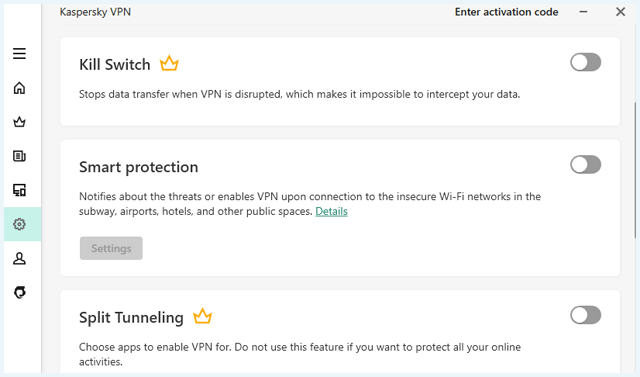
You can Kaspersky’s kill switch, whether you’re using the VPN on Windows, macOS, Android or iOS.
Does Kaspersky VPN leak your data?
A VPN is supposed to spoof your location and change your IP address. Kaspersky does just that, as we noticed a different IP address each time we connected to a server. Thankfully the VPN doesn’t show the location of each server we select. Furthermore, it does not suffer from IPv4/IPv6 leaks.
We also ran leak tests, and there were no indications of any Kaspersky VPN DNS leaks or WebRTC leaks.
What information does Kaspersky VPN need?
To create an account with Kaspersky, you’ll need to enter the following details:
- First and last name
- Email address
- Residential address
- Country
- Payment information
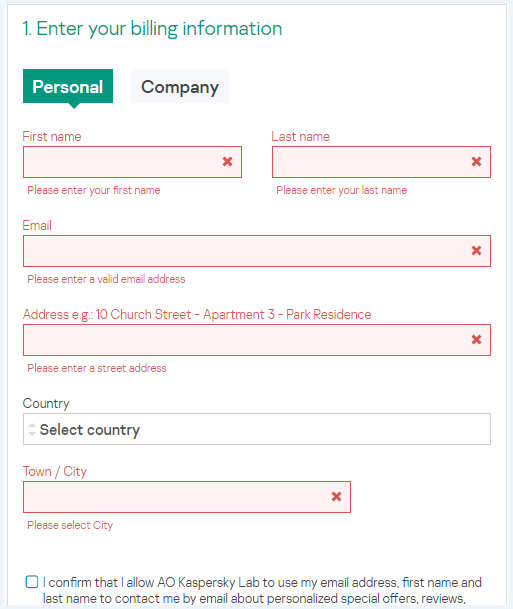
Usability – How User-Friendly is Kaspersky VPN?

Overall, Kaspersky is beginner friendly, but it may not be a great choice for advanced users, because of the lack of customization features. As a result, the VPN earns a 5/10. Here are our observations in a nutshell:
- Kaspersky VPN is easy to install and use.
- The UI is very neat and easy to navigate.
- Pricing changes based on your location, but you can pay with credit/debit cards and PayPal in many areas.
- Customer service is slow, and the live chat is not particularly helpful.
Kaspersky VPN’s website and installation process
Once you visit the Kaspersky VPN Secure Connection website and download the VPN, you can install it for whichever device you want.
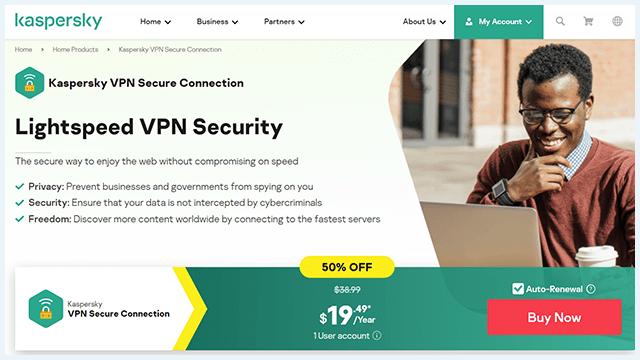
Kaspersky offers native apps for Android, iOS, Windows and macOS, but there’s none for Linux. However, this is pretty barebones. This gives you enough choice, but other VPNs, like NordVPN, also offer a browser extension.
You can also install VPNs like NordVPN on a wide range of platforms, including Firestick, Playstation, Xbox, Nintendo Switch, Raspberry Pi, Chromebook, Chromecast, Kindle Fire, and Oculus Quest.
Installing Kaspersky VPN is a breeze. Here’s the step-by-step guide.
- Go to the Kaspersky VPN page, scroll to the bottom and click “Download” under the free plan.
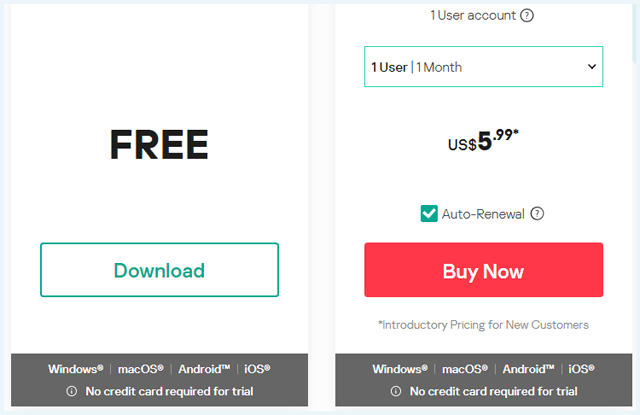
- You can also purchase a new subscription by just clicking on “Buy Now.”
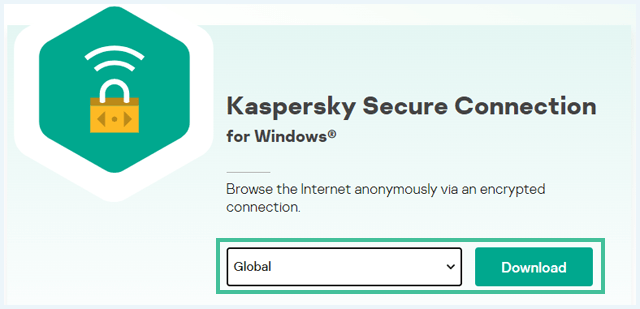
- Open the file you just downloaded and follow the steps outlined by the installation wizard.
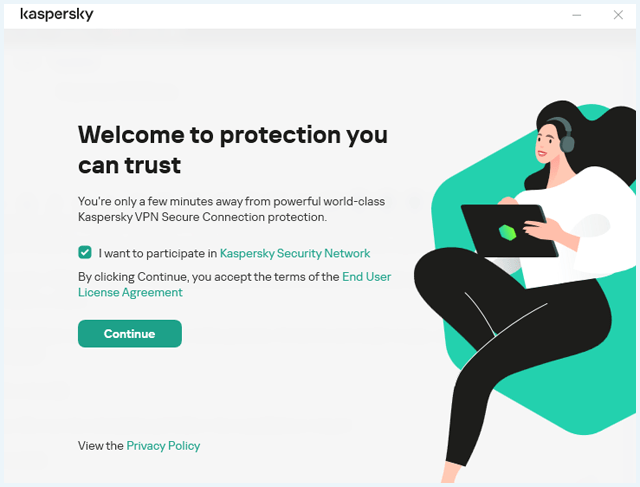
- Open the Kaspersky app and enter your activation code (in case you bought the paid version of the software). That’s it! You can now use the Kaspersky VPN
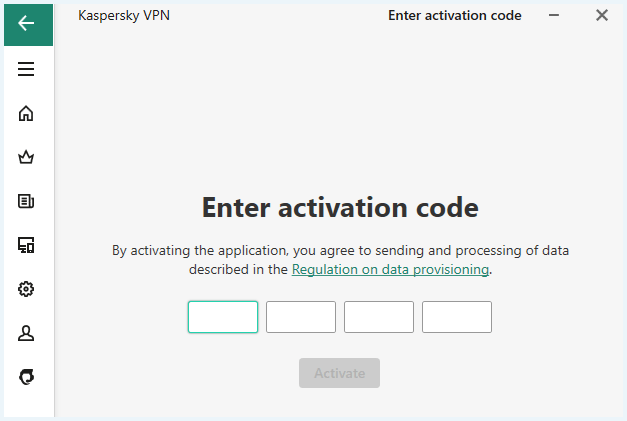
Kaspersky VPN’s appearance and ease-of-use
For starters, Kaspersky VPN’s apps are very well-designed.. It’s great to see that the VPN uses a minimalist design approach, ensuring that there’s no clutter on the app. This is a common feature of the best beginner-friendly VPNs.
We also like the fact that the app is well-organized and easy to navigate. When you open the app, you’ll be greeted with a large power button that enables you to turn the VPN on or off.
At the bottom of that screen, you’ll find a shortcut tab that allows you to switch between servers. Everything worked smoothly during our testing.
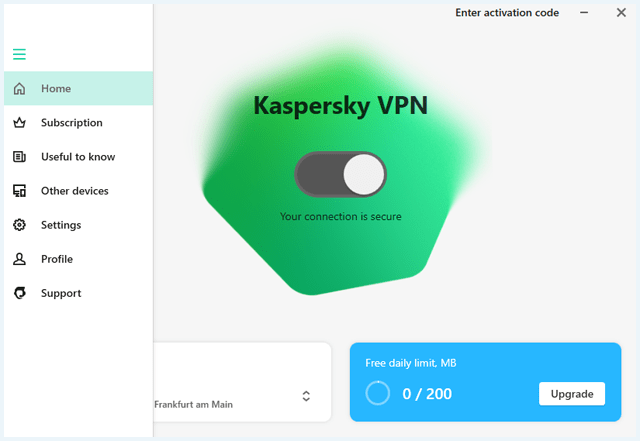
Everything else is under the hamburger menu at the top-left corner of your screen. Here’s a roundup of the options under the button and what they each entail:
- Subscription: subscription details
- Useful to know: highlights of vital information about Kaspersky VPN
- Other devices: links to install Kaspersky VPN on various devices
- Settings: startup options, kill switch, smart protection, split tunneling, notifications
- Profile: link to sign in to your Kaspersky account
- Support: links to Kaspersky’s support options
Pricing and payment methods
Kaspersky VPN has a free version, although you get only 200MB per day. If you want unlimited traffic and access to the VPN’s full suite of features, then you’ll have to choose from one of the two paid plans:
- Monthly plan: $4.99 each month
- Yearly plan: $15.00 in total

The plans above are for the United States. Note that the pricing might change depending on your location. For instance, the one-year plan in South Africa costs $34.49 per year.
However, Kaspersky’s first year pricing is quite competitive. For comparison, Surfshark, one of the cheapest VPNs, costs $47.88 ($3.99 per month).
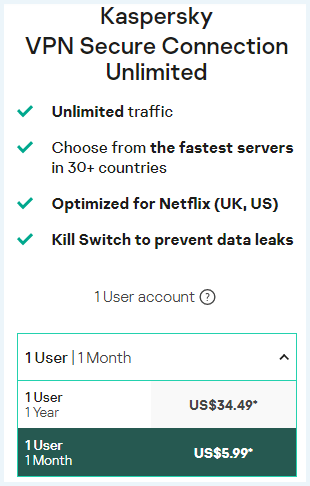
Kaspersky VPN indicates that the prices are “introductory,” meaning you’ll pay a higher price for the subsequent year. However, you can use each plan on five devices simultaneously. If you want a VPN to use on an unlimited number of devices, consider Surfshark VPN.
If you’re unsure about Kaspersky VPN, you can test it using the seven-day free trial. Thankfully, you don’t even need to enter your credit card details to access the trial. Even if you pay for a subscription, you can get a full refund if you make a request within 30 days.
You can purchase a subscription using the following payment methods:
- Credit cards (VISA, MasterCard, American Express)
- Bank/wire transfer
Again, your payment options might differ based on your location. Unfortunately, Kaspersky doesn’t allow cryptocurrency payments. Such payments are perfect if you want to remain anonymous.
Customer service
When we review VPNs for customer service, we look out for the quality of their knowledge base, support options, and just how responsive each one is.
Kaspersky VPN Secure Connection offers the following support options:
- Knowledge base
- User guide
- FAQs
- Live chat
- Phone
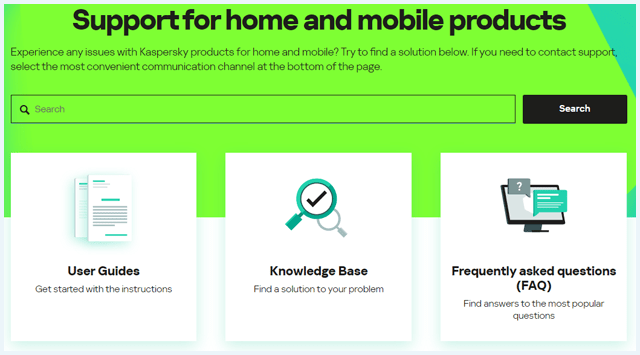
Let’s start with the knowledge base. Kaspersky VPN’s knowledge base is full of helpful and insightful articles. The articles are organized under various operating systems, making it easy to find relevant articles.
There’s also a handy user guide section that contains information on how to get started with the VPN. The FAQ section is rather disappointing since it focuses more on answering questions about the more famous Kaspersky Antivirus.
If the information on the knowledge base is not enough, you can reach out to Kaspersky through the following channels:
- A ticket system with replies via email
- Phone number
- Live chat
For the ticketing system, you have to fill several fields, which can be discouraging for users. The company promises replies in 24 hours through email, but all we received was an automated response; we never got the answer to our question.
The live chat was equally disappointing. It’s available in Europe, the USA, and Canada, but you can’t use it if you’re in other regions, like Africa. The live chat was generally unhelpful, only providing generic responses to our queries.
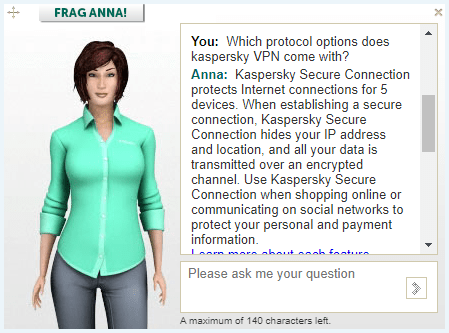
Server Network – Can Kaspersky VPN Unblock the Internet?

Ideally, you want to choose a VPN with a larger server network A huge VPN server network gives you a higher chance of bypassing geoblocks, dealing with online censorship, and improving connection speeds.
Kaspersky Secure Connection’s VPN server network earns it a 6/10. Here are the reasons:
- Kaspersky has servers in over 30 countries and 85 locations.
- It can help you unblock Netflix, Hulu and other streaming services.
- Torrenting is allowed.
- It doesn’t offer dedicated IP addresses.
Number of servers and locations
Kaspersky VPN has servers in 85+ locations in more than 30 countries. True, this number doesn’t quite match the likes of ExpressVPN (94 countries) and CyberGhost (91 countries), but it’s still respectable.
Below are the countries and continents Kaspersky VPN has servers in:
- Europe: Andorra, Armenia, Austria, Belgium, Bosnia and Herzegovina, Croatia, Cypress, Czech Republic, Denmark, Estonia, Finland, France, Georgia, Germany, Greece, Hungary, Iceland, Ireland, Bulgaria, Italy, Lithuania, Luxembourg, Malta, Monaco, Netherlands, Norway, Poland, Portugal, Romania, Russia, Serbia, Slovakia, Slovenia, Spain, Sweden, Switzerland, Turkey, Ukraine, and the United Kingdom
- North America: Canada and the United States
- Latin America and the Caribbean: Argentina, Brazil, Chile, Columbia, Costa Rica, Ecuador, Guatemala, Mexico, and Panama
- The Middle East and Africa: Egypt, Israel, South Africa, and the UAE
- Asia Pacific: Australia, Cambodia, Hong Kong, India, Indonesia, Japan, Kazakhstan, Nepal, New Zealand, Pakistan, Philippines, Singapore, South Korea, Taiwan, Thailand, and Vietnam
Dedicated IP address
Unfortunately, Kaspersky VPN Secure Connection doesn’t come with dedicated IP addresses. This might be a problem, especially if you want to access your bank account from a foreign country.
Kaspersky VPN and streaming (Netflix, Disney Plus, Hulu, BBC iPlayer)
We checked if Kaspersky VPN could unblock the most popular streaming services, and we’ve summarized our results in the table below:
| Platform | Can Kaspersky VPN unblock it? |
|---|---|
| Netflix | ✔ |
| Disney Plus | ✔ |
| Hulu | ✔ |
| BBC iPlayer | ✔ |
Kaspersky VPN doesn’t have specialized streaming servers like CyberGhost or special streaming features like NordVPN’s Smartplay. However, the VPN has no trouble unblocking streaming services.
We were able to unblock Netflix libraries for several, including the UK, USA, Netherlands, Japan, Canada, Australia, and Turkey.
That said, we couldn’t unblock Netflix with Kaspersky’s free servers. You’ll need one of the best free VPNs for Netflix for that.
In a similar fashion, Kaspersky VPN Secure Connection helped us get past geoblocks and access various streaming services, including BBC iPlayer, Hulu, and Disney Plus.
As we anticipated (based on Kaspersky VPN’s speeds), we were able to stream and watch several shows, including some of the best Netflix movies, without any lags or buffering.
Kaspersky VPN and torrents
If you’re into torrenting, Kaspersky VPN Secure Connection is right for you. The VPN allows anonymous P2P filesharing on its servers, and you won’t experience any speed throttling.
We were able to use uTorrent and BitTorrent without any difficulty. Alternatively, you can choose from the best VPNs for torrents. However, be sure to learn about torrenting and copyright laws in your country to avoid downloading fines before using a VPN for torrents.
Our Experience With Kaspersky VPN
Overall, Kaspersky VPN is a fast and easy-to-use VPN that’s great for streaming. However, their fishy privacy policy and run-ins with the American government and the European Parliament mean that we’re hesitant to recommend it wholeheartedly.
If you want a secure VPN with privacy features you can bank on, NordVPN is the best bet. The VPN is registered in Panama, which is a privacy-friendly jurisdiction. It’s one of the top no-logs VPNs and runs on RAM-only servers.
Do you have a question about Kaspersky VPN? We’ve put together answers to the most frequently asked questions about Kaspersky VPN. Just click on any one of these to read the full answer.
Kaspersky is a fast VPN that’s useful for streaming, torrenting, and gaming. However, its dubious privacy policy and its suspected ties with the Russian government mean you have to be careful with this VPN. Read our Kaspersky VPN review to learn more.
NordVPN is faster and has more security and privacy features compared to Kaspersky. NordVPN also has a larger server network and is better for getting past geo-blocks and online censorship. Read our NordVPN review to learn more about this premium VPN service.
It depends. Kaspersky VPN is great for streaming, torrenting and playing games, particularly because of it’s fast speeds. However, it might not be the best if you want to browse the internet safely without worrying about your data being compromised. For that, we recommend NordVPN.
Kaspersky easily unblocks Netflix libraries in several countries, including the US, UK, Japan, Australia, and Turkey. Learn more about the VPN’s streaming performance in our Kaspersky VPN review.
